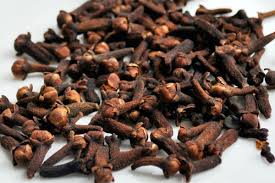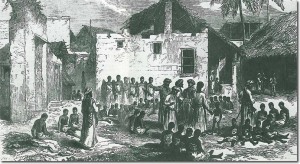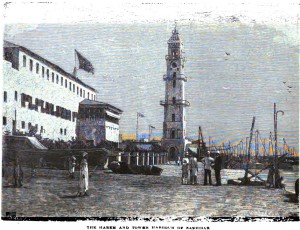
Zanzibar is one of the main archipelago of Tanzania, and actually the name Tanzania comes from combining the names Tanganyika and Zanzibar. It is situated on the Swahili Coast, adjacent to Tanganyika (mainland Tanzania). Located in the Indian Ocean, Zanzibar consists of many small islands and two large ones: Unguja (the main island, referred to informally as Zanzibar) and Pemba. The capital is Zanzibar City, located on the island of Unguja. Its historic center, Stone Town, is a World Heritage Site. So why the name Zanzibar?
The name Zanzibar comes from the Arabic Zanjibār (زنجبار), which in turn comes from the Persian Zang-bār (زنگبار), a compound of Zang (زنگ, “Black“) + bār (بار, “coast, land, country“), name given by Persian navigators when they visited the area in the middle ages. So, in essence, Zanzibar means the “land of the Blacks” or “the land of the Black people,” or “the coast where Black people live.”

Traders from the Arabian Peninsula, the Persian Gulf region of modern-day Iran (especially Shiraz), and west India probably visited Zanzibar as early as the 1st century. Zanzibar was used as a base for voyages between the Middle East, India, and Africa. In the olden days, the archipelago was known as Spice islands, and was world famous for its cloves (see the article I wrote So much for that clove in your food!) and other spices.
Vasco da Gama‘s visit in 1498 marked the beginning of European influence. In 1503 or 1504, Zanzibar became part of the Portuguese Empire. Zanzibar remained a possession of Portugal for almost two centuries. In 1698, Zanzibar fell under the control of the Sultanate of Oman. In 1832, or 1840, Said bin Sultan moved his capital from Muscat, Oman to Stone Town in Zanzibar City.

Malindi in Zanzibar City was the Swahili Coast’s main port for the slave trade with the Middle East. In the mid-19th century, as many as 50,000 slaves passed annually through the port. Many became rich through the slave trade, such as the notorious Arab slave trader and ivory merchant, Tippu Tib. Today, there are still vestiges of old slave forts in Stone Town.
Until around 1890, the sultans of Zanzibar controlled a substantial portion of the Swahili Coast, known as Zanj, which included Mombasa and Dar es Salaam. Beginning in 1886, Great Britain and Germany plotted to obtain parts of the Zanzibar sultanate for their own empires. Over the next few years, however, almost all of these mainland possessions were lost to European imperial powers.

In 1890 Zanzibar became a protectorate (not a colony) of Britain. This status meant it continued to be under the sovereignty of the Sultan of Zanzibar. From 1890 to 1913, traditional viziers were in charge; they were supervised by advisors appointed by the Colonial Office. However, in 1913 a switch was made to a system of direct rule through British governors. The death of the pro-British Sultan Hamad bin Thuwaini on 25 August 1896 and the succession of Sultan Khalid bin Barghash, whom the British did not approve of, led to the Anglo-Zanzibar War, known as the shortest war in history lasting 38 minutes.

On 10 December 1963, the Protectorate that had existed over Zanzibar since 1890 was terminated by the United Kingdom. The United Kingdom did not grant Zanzibar independence, as such, because the UK had never had sovereignty over Zanzibar. Rather, by the Zanzibar Act 1963 of the United Kingdom, the UK ended the Protectorate and made provision for full self-government in Zanzibar as an independent country within the Commonwealth. Upon the Protectorate being abolished, Zanzibar became a constitutional monarchy under the Sultan. However, just a month later, on 12 January 1964 Sultan Jamshid bin Abdullah was deposed during the Zanzibar Revolution. The Sultan fled into exile, and the Sultanate was replaced by the People’s Republic of Zanzibar and Pemba. In April 1964, the republic merged with mainland Tanganyika. This United Republic of Tanganyika and Zanzibar was soon renamed, blending the two names, as the United Republic of Tanzania, within which Zanzibar remains a semi-autonomous region.

Today, Zanzibar is world-renowned for its great tourism, with Stone town showing remnants of the ancient Swahili kingdom, and the melting pot of cultures (Persian, Arabic, Bantus, European), and its cloves. Enjoy the video below, and whenever you visit Zanzibar, remember that it is the Land of the Black people!


Wow.i love this
LikeLike
Thanks for commenting.
LikeLiked by 1 person
Your welcome
LikeLike
Next time you plan a trip to East Africa,We wish to be the people to welcome you into East Africa(Kenya,Uganda,Tanzania, Rwanda)
http://www.karibueafrica.com
#FollowUSBack
LikeLike
Thank you for the connection. We will be happy visiting East Africa, and happy to count on you.
LikeLiked by 1 person
Any time.We are ready to be of help. Email:info@karibueafrica.com,Mobile:+255759393978,Website: http://www.karibueafrica.com
LikeLike
ok,lets keep contact.
Email:info@karibueafrica.com
Mobile:+255759393978
Locations: Kenya,Uganda and Tanzania
LikeLike
That’s good to know about Zanzibar. Looks like a great place. Funny enough, I have some fair trade Zanzibar spices at home that I use to season my food.
LikeLike
Nice island, thank you
LikeLike
My father was born in Zanzibar, Hassanali Suleiman Bhanji (1919); worked with HH Agakhan Provincial Council of Zanzibar, before being transferred to the coastal town of Tanga, in the then Tanganyika mainland.
After my Dad’s marriage to my mother, Roshan; a few years later, joined my maternal Grandfather, Shariff Karsan in his flourishing and expanding Wholesale Khanga and Kitenge business, located in the Ngamiani area of Tanga.
On Akida Street (now Mkwakwani Street), first on Barabara (Street) 4 – later to move to his purpose built building, further down – between Barbara Six and Barabara Saba (7).
My Father was very active within the Shia Imami Ismailia Community in Tanga, as well as in the Civic, Business, Muslims and Charity sectors of Tanga.
Served as Deputy Mayor of Tanga, President of Tanga Chamber of Commerce, Founder Chairman of the All Muslim League, and a founder member of the Tanga Rotary Club.
During the building of the new Ismailia Jamatkhana (in the Usugara area), and the opening on 9th August 1963, Dad was the President of HH Agakhan Provincial Council of Tanga.
Dad’s maternal Grandfather was Peera Dewjee, an aide to the Sultan of Zanziber, whi went on to become his defacto Prime Minister in the late 1880s.
So it was fascinating to read about the entomology of Zanzibar, and how it got its name.
Ahsante Sana, Bwana!!
Shiraz H. Bhanji
(Now in United Kingdom)
LikeLike
Thank you, Shiraz, for sharing the story of your father which is intricately related to Zanzibar
LikeLike
Pingback: The slave market in Zanzibar island - Natania Travel
Pingback: ZANZIBAR, a tropical paradise in the Indian Ocean - Natania Travel